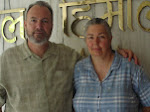TEXT:
"And Saul was very wroth, and the saying displeased him; and he
said, They have ascribed unto David ten thousands, and to me they have ascribed
but thousands: and what can he have more but the kingdom?" (I Samuel 18:8)
I. SELF-CENTEREDNESS
A.
Evidence of Saul's self-centeredness is more pronounced as seen in the
above text. Saul's very same problem
manifested in Jonathan's victories in Chapters 13 and 14 also surfaced in
David's victory.
B. Saul's self-centeredness seen in relationship
to the victories of Jonathan and David certainly was in Saul during the time
between the victories. As with
backsliding and any other unrighteous characteristic in us they do not just pop
up one day. They are in us, right from
the very start, all the while waiting to be manifested.
C. Even as we grow in the LORD and even when He
begins to work in our lives in a greater way certain things not of Him are
still rooted in us. And unless we allow
God to lay an axe to the roots and gives it a death blow it will continue to
linger in us quietly causing us great frustration and unfullment in the things
of God. We will just go through the
motions not inwardly being truly satisfied with our relationship with the LORD
and fail away. Most often we blame our Brothers and Sister, the Pastor, and
even the world for our failure, but again it is a manifestation of our desire
to not allow God to work in our lives.
E. When Saul moved to avenge his enemies in I
Samuel 14:24 he does not move in divine direction.
"And the men of Israel were distressed that day: for Saul had
adjured the people, saying, Cursed be the man that eateth any food until
evening, that I may be avenged on mine enemies. So none of the people tasted
any food." (I Samuel 14:24)
F. He moved in his spirit wanting to do his own
thing for his own purpose. "That I may be avenged on mine
enemies." Doing his own thing brought great trouble.
G. But Jonathan moved in a different direction
(eating) while his father moved in another direction (fasting) "Then said Jonathan, My father hath
troubled the land: see, I pray you, how mine eyes have been enlightened,
because I tasted a little of this honey."
(I Samuel 14:29)
H. Upon one (Jonathan) there was enlightenment;
upon the other (Saul) there was darkness.
Jonathan acted out of necessity; Saul acted out of self-honor and glory.
Saul hindered or limited God.
"How
much more, if haply the people had eaten freely to day of the spoil of their enemies
which they found? for had there not been now a much greater slaughter among the
Philistines?" (I Samuel 14:30)
I. Jonathan knew and understood the need for
food for energy in the time of battle. (The manna ceased and the meat diet
began for the Children of Israel just before the conquest of the Promised Land)
If the people would have followed Jonathan's example, there would have been a
great victory, and sin would have been prevented. Saul moved in ignorance being self-centered
and blind which brought about unfavorable results.
"And they smote the Philistines that day
from Michmash to Aijalon: and the people were very faint. 32 And the
people flew upon the spoil, and took sheep, and oxen, and calves, and slew them
on the ground: and the people did eat them with the blood.33 Then
they told Saul, saying, Behold, the people sin against the LORD, in that they
eat with the blood. And he said, Ye have transgressed: roll a great stone unto
me this day." (I Samuel 14:31-33) The direction which Saul took moved
the people into sin.
J. As
Saul continued to withdraw from God there was a response from God to that
withdrawal. The response was silence (which is a response). Thus a breakdown in
communication occurred,
"And
Saul asked counsel of God, Shall I go down after the Philistines? wilt thou
deliver them into the hand of Israel? But he answered him not that
day." (I Samuel 14:37) The
reason God did not answer Saul and was silent was because Saul had withdrawn
himself from God. Saul rejected the
commandments of God.
K. Disobedience led to rebellion. Therefore, God rejected Saul. He had been living in the disastrous place of
wickedness, and was spiritually in very bad shape. But he continued to move
more and more in his backsliding direction.
II. PARTING THOUGHTS
A. Saul did not intend to take the blame for his
condition and the pitiful situation. He
sought a scapegoat upon which to lay the blame.
Self must not look bad nor take the blame which is the pride of life.
"For all that is in the world, the lust
of the flesh, and the lust of the eyes, and the pride of life, is not of the
Father, but is of the world." (I
John 2:16)
B. When sin gravitates from "the list of
the flesh" to "the lust of the eyes" repentance becomes more difficult. When service to sin by the flesh and by the
mind moves into man's spirit, "the pride of life" hopelessness sets
in. Certainly it is not absolute hopelessness, but recovery is extremely
difficult and rare. Saul did not recover.
He laid the blame upon Jonathan his own son. (I Samuel 14:38-45)


No comments:
Post a Comment